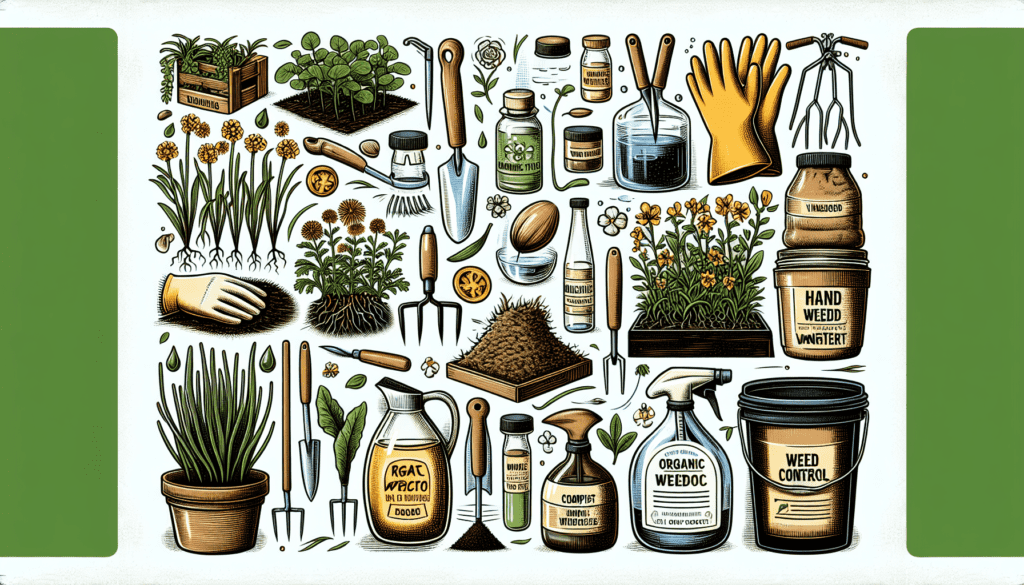Welcome to “The Best Practices for Organic Weed Control.” In this article, you’ll discover effective and environmentally friendly ways to keep pesky weeds at bay in your garden or lawn. From mulching to hand-pulling, these tried and true methods will help you maintain a beautiful and weed-free landscape without the use of harmful chemicals. Say goodbye to stubborn weeds and hello to a flourishing garden with these organic weed control techniques. Have you ever struggled with keeping your garden free of pesky weeds without using harmful chemicals?

Understanding Organic Weed Control
When it comes to organic weed control, it’s all about using natural methods to prevent and eliminate weeds without the use of synthetic chemicals.
The Importance of Organic Weed Control
Organic weed control is essential for maintaining a healthy ecosystem in your garden. Chemical herbicides can not only harm the environment but also affect the soil quality and overall health of your plants.
Preventing Weeds Naturally
Preventing weeds from taking over your garden is the first step in organic weed control.
Mulching
Mulching is a great way to prevent weeds by blocking sunlight and preventing weed seeds from germinating. Organic mulches such as straw, wood chips, or leaves can also improve soil quality as they decompose.
Planting Cover Crops
Cover crops such as clover or buckwheat can suppress weed growth by outcompeting them for nutrients and space. They also help improve soil health by adding nutrients back into the soil when they are tilled under.
Organic Weed Control Methods
When weeds do pop up in your garden, there are several organic methods you can use to control them.
Hand Pulling
Hand pulling weeds is a labor-intensive but effective way to control weeds in your garden. Make sure to pull the entire plant, including the roots, to prevent regrowth.
Hoeing
Hoeing is another effective method for larger areas infested with weeds. Use a sharp hoe to slice weeds just below the soil surface, making sure to sever the roots for better control.
Vinegar
Vinegar is a natural herbicide that can be effective at killing weeds. Be sure to use vinegar with a high acetic acid concentration, and apply it directly to the leaves of weeds on a sunny day for best results.
Natural Weed Killer Recipes
If you’re looking for homemade weed killer recipes that are safe for the environment and effective at controlling weeds, try these natural options.
Vinegar and Dish Soap
Mix vinegar with a few drops of dish soap to create a homemade weed killer. The soap helps the vinegar stick to the leaves of the weeds, while the acidity of the vinegar kills the plants.
Salt Solution
A solution of water and salt can be an effective weed killer for driveways or walkways where you don’t want any plant growth. Be careful when using salt as it can make the soil inhospitable for any plants in the future.

Companion Planting for Weed Control
Companion planting is a natural way to control weeds by utilizing the symbiotic relationships between plants.
Marigolds
Marigolds are known to repel many common garden pests, including nematodes, aphids, and whiteflies. Planting marigolds around your vegetable garden can help deter pests that may attract weeds.
Nasturtiums
Nasturtiums not only add a pop of color to your garden but also attract insects that prey on pests such as aphids and caterpillars. By planting nasturtiums near susceptible plants, you can help control pest populations that may cause weed issues.
Using Organic Weed Control Products
If you prefer to purchase organic weed control products, there are several options available that are safe and effective.
Corn Gluten Meal
Corn gluten meal is a natural pre-emergent herbicide that can prevent weed seeds from germinating. It is safe to use around pets and children and can also add nitrogen to the soil as it breaks down.
Citrus Oil
Citrus oil is a natural herbicide derived from the peels of citrus fruits. It can be effective at controlling weeds by suffocating the leaves and disrupting their cell structure.
Maintaining a Weed-Free Garden
Once you’ve implemented organic weed control practices in your garden, it’s essential to maintain a weed-free environment to prevent future issues.
Regular Inspections
Make it a habit to walk through your garden regularly and inspect for any signs of weed growth. Catching weeds early can prevent them from spreading and becoming a more significant issue.
Mulch Maintenance
Keep up with mulch replenishment to ensure that weeds are continuously suppressed. Mulch can break down over time, so adding a fresh layer can help maintain a barrier against weed growth.
Crop Rotation
Rotating your crops annually can help disrupt weed cycles and prevent the buildup of soil-borne diseases. By planting different crops in the same area each year, you can confuse weeds and reduce their prevalence.
Conclusion
By understanding the best practices for organic weed control and implementing natural methods to prevent and eliminate weeds, you can keep your garden healthy and thriving without the need for harmful chemicals. Whether you choose to hand pull weeds, use natural herbicides, or plant companion crops, there are plenty of organic options available to help you maintain a weed-free garden.

